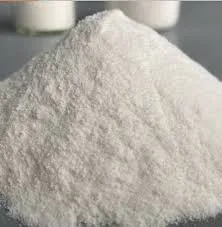
Dec . 05, 2024 11:26 Back to list
Hydroxyethyl Cellulose Natural Properties and Applications in Various Industries
Hydroxyethylcellulose A Natural Polymer for Modern Applications
In recent years, hydroxyethylcellulose (HEC) has garnered significant attention for its versatile applications across various industries. As a non-ionic, water-soluble polymer derived from cellulose, HEC is a modified form of natural cellulose that combines the benefits of its natural origins with enhanced properties suitable for contemporary uses. This article explores the unique characteristics of hydroxyethylcellulose, its applications, benefits, and its increasing popularity as a natural ingredient.
What is Hydroxyethylcellulose?
Hydroxyethylcellulose is produced by the etherification of cellulose, a naturally occurring polymer found in the walls of plants. Through a chemical process involving the introduction of hydroxyethyl groups into the cellulose structure, HEC becomes soluble in cold water and forms a viscous gel. This transformation not only enhances the functionality of cellulose but also retains its natural origin, making it an appealing choice for various applications.
Key Properties of Hydroxyethylcellulose
The key attributes of hydroxyethylcellulose that have contributed to its widespread use include
1. Thickening Agent HEC is an effective thickener, helping to increase the viscosity of solutions without altering their appearance. This property is especially valuable in cosmetic formulations, ensuring that products such as lotions and creams maintain a desirable texture.
2. Stabilizer and Emulsifier HEC acts as a stabilizer for emulsions, preventing the separation of oil and water phases in formulations. This characteristic is essential for the consistency and effectiveness of products such as shampoos and conditioners.
3. Film-Forming Ability The polymer's film-forming properties enable its use in a range of applications, including coatings and adhesives. HEC creates a protective layer that enhances the durability and longevity of products.
hydroxyethylcellulose natural

4. Biodegradable and Environmentally Friendly As a natural derivative, HEC is biodegradable, which aligns with the growing consumer demand for sustainable and eco-friendly products.
Applications of Hydroxyethylcellulose
HEC has found its way into numerous industries, including cosmetics, pharmaceuticals, food, and construction. Some of the notable applications include
1. Personal Care Products HEC is widely used as a thickener and stabilizer in lotions, creams, gels, and various cosmetics. Its ability to retain moisture makes it a popular choice for hydrating formulas.
2. Pharmaceutical Formulations In the pharmaceutical industry, HEC serves as a binder and thickener in the production of various medications, including topical ointments and oral suspensions. Its biocompatibility also makes it safe for use in pharmaceutical applications.
3. Food Industry HEC is utilized as a food additive to enhance the texture and mouthfeel of various products. It can also act as a stabilizer in salad dressings and sauces, contributing to a desirable consistency.
4. Construction and Building Materials In the construction sector, HEC is incorporated into cement and mortar formulations to improve workability and adhesion, making it a key additive in modern building materials.
Conclusion
The significance of hydroxyethylcellulose lies in its ability to combine the natural benefits of cellulose with enhanced functional properties, making it an invaluable ingredient across multiple industries. As consumer preferences shift toward eco-friendly and sustainable products, the popularity of HEC is likely to continue its upward trajectory. Whether in personal care, pharmaceuticals, food, or construction, hydroxyethylcellulose demonstrates its versatility, efficacy, and adaptability, solidifying its position as a natural polymer that meets the demands of modern applications. In a world increasingly concerned with sustainability, HEC stands out as a prime example of how natural ingredients can play a critical role in technological advancements and consumer products.
-
Versatile Hpmc Uses in Different Industries
NewsJun.19,2025
-
Redispersible Powder's Role in Enhancing Durability of Construction Products
NewsJun.19,2025
-
Hydroxyethyl Cellulose Applications Driving Green Industrial Processes
NewsJun.19,2025
-
Exploring Different Redispersible Polymer Powder
NewsJun.19,2025
-
Choosing the Right Mortar Bonding Agent
NewsJun.19,2025
-
Applications and Significance of China Hpmc in Modern Industries
NewsJun.19,2025







